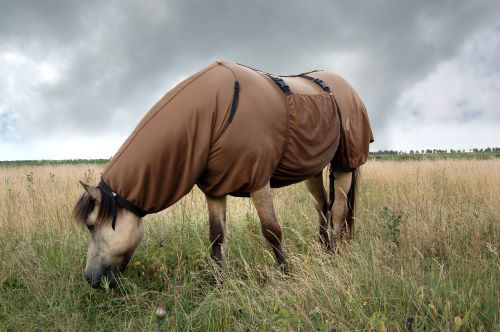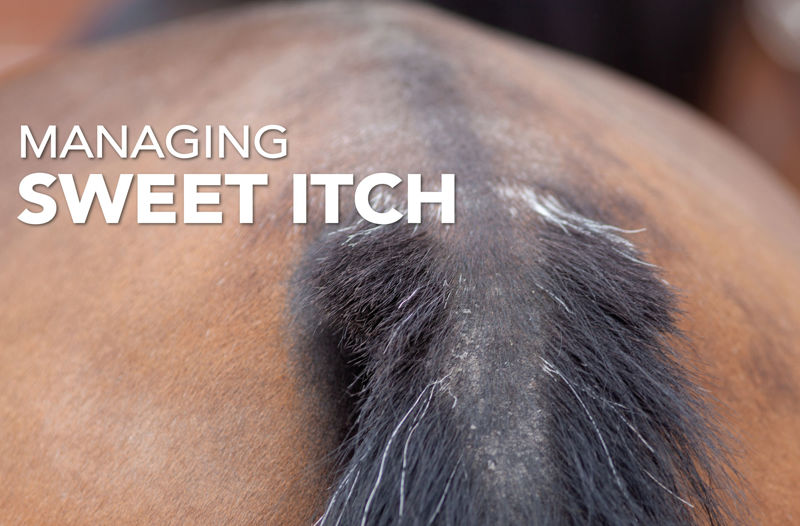Equine insect bite hypersensitivity (IBH), also known as Sweet Itch, is an allergic skin disease in horses which presents as extreme itching and in turn damages the skin. Good skin health is important for the horse as the skin has several vital roles, including acting as a barrier to external challenges, helping to control body temperature, and also helping to make Vitamin D.

Pony suffering badly from Sweet Itch
What is Sweet Itch?
Sweet Itch is a skin allergy caused by a reaction to the saliva of the Culicoides species of midges. Horses with this condition typically suffer with severe itching from about March to October in the UK, when midges are active.
The irritation can cause the horse to rub and scratch the affected areas intensely, which can lead to patchy hair loss, sores and scabs. The mane and top third of the tail are the most common areas affected. The abdomen, head, side of the body, and chest can also be affected, although to a lesser extent.
Hypersensitivity to the midge can be categorised into two allergies posing different reactions. Some horses may react immediately and often present in hives, whereas others (more commonly) have a delayed reaction causing itching to particular areas of the body, however some horses may have symptoms of both.
A vet will diagnose the condition following an examination which includes dermatologic testing. A of yet, cure has not been found despite ongoing research, however there are treatments for severe cases which include topical corticosteroids and systemic antihistamines.
How to manage your horse's Sweet Itch
If you know your horse has previously suffered with sweet itch, it is important to start taking precautions early in the season:
- Avoid turning out between dawn and dusk when midges are most active.
- If possible, turn your horses out away from water source. Midges typically like to breed in a damp environment, so they are often more common by ponds and streams.
- Midges thrive on droppings. Therefore, poo-picking your horse’s fields should be a regular practice.
- Many owners of sweet-itch sufferers use a Boett ‘sweet-itch rug’. These rugs (pictured below) are designed with a fine mesh to prevent the midge from coming into direct contact with the horse, effectively acting as a barrier. Fly rugs will also help if you do not have access to a Boett rug.
- Fly repellents sprayed over the horse, particularly in sensitive areas such as the chest and the flanks can be useful in deterring midges from biting.
- A balanced diet can be very beneficial as it will help support optimal skin health for your horse.

Example of a Boett rug
Summary
Equine insect bite hypersensitivity (IBH), also known as Sweet Itch, is a common allergic condition in horses caused by a reaction to the saliva of Culicoides midges. This skin disease leads to severe itching, hair loss, and sores, that primarily affect the mane and tail. While there's no cure for Sweet Itch, effective management can greatly improve your horse’s comfort. Start early in the season by avoiding midge-heavy areas, using fly rugs or Boett rugs for protection, and applying fly repellents, and feeding a fly detering and/or skin soothing supplement. Additionally, regularly poo-picking the field helps reduce midge populations. Consulting with a vet can also provide tailored treatments such as topical corticosteroids and antihistamines for severe cases. By taking proactive steps, you can help alleviate the discomfort of Sweet Itch and support your horse’s overall skin health, ensuring they are more comfortable and protected from insect bites.
For any nutritional advice or questions you may have, please don't hesitate to reach out to our expert nutrition team. You can call 0800 585525 Monday-Friday 8:30am-5:00pm. Email [email protected], or send us a DM on social media.



